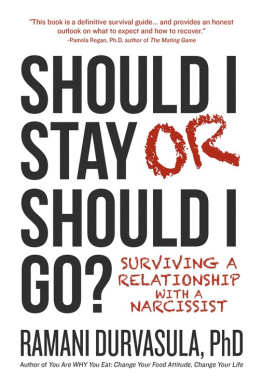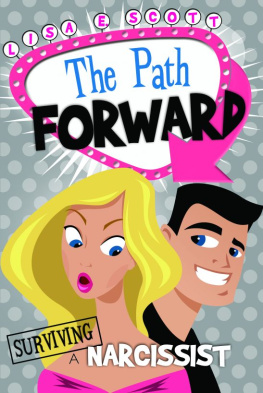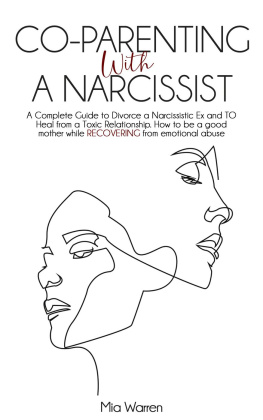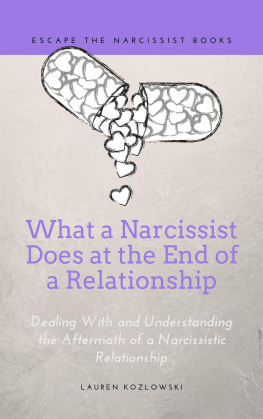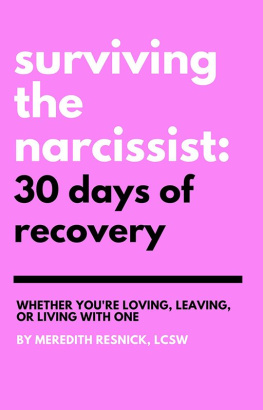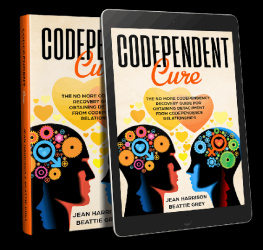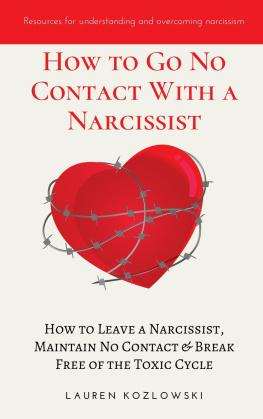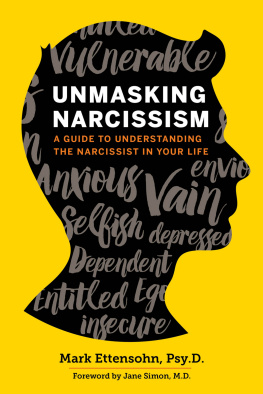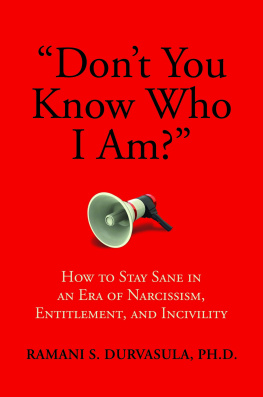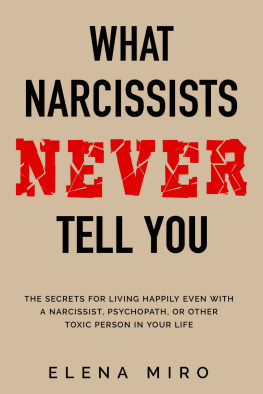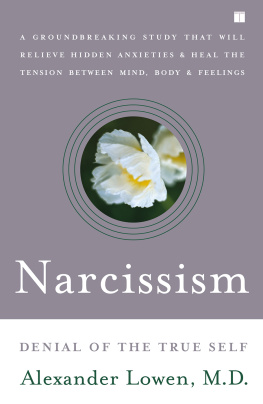B Y THE S AME A UTHOR
You Are WHY You Eat
CHAPTER 2
NARCISSISM IS THE NEW BLACK
This Narcissus of ours
Cant see his face in the mirror
Because he has become the mirror.
ANTONIO MACH A DO
These days the new N word is narcissism.
Most people know its not a nice word, but few people know what it really means. But just like Supreme Court Justice Potter Stewart said all those years ago about pornography (I know it when I see it), its the same way with narcissism.
The selfie. Reality TV. Social media. Whats your brand? Am I fabulous? Will you follow me back? Narcissism is, indeed, the new world order. It is the reality TV star who can talk for 15 minutes about her new hair extensions or handbag. It is the professional athlete, such as Lance Armstrong, who says to the cynics and the skeptics: Im sorry for you. Im sorry you cant dream big and Im sorry you dont believe in miracles. It is musicians, such as Kanye West, who was quoted in W Magazine saying, I made that song because I am a god... I dont think theres much more explanation. Its people like Bernie Madoff, who bilked investors of billions while living a life of extraordinary luxury and maintaining a grandiose illusion that people wanted to believe. A Vanity Fair article on the financier captured his narcissistic behavior perfectly:
Bernie is not what you would call Mr. Nice Guy, not someone you would want to have a beer with, one insider volunteered. He was imperial, above it all. If he didnt like the conversation, he would just get up and walk away. It was Im Bernie Madoff and youre not. If we were to post a rogues gallery of prominent narcissists, it would go on for thousands of pages and be populated by celebrities, businessmen, prime ministers and presidents, athletes, musicians, artists, producers, and perhaps even your next door neighbor, your boss, or the guy sleeping next to you right now.
What Is Narcissism?
The Diagnostic and Statistical Manual of Mental Disorders, Fifth Edition (DSM-5) defines narcissistic personality disorder as a pervasive pattern of grandiosity, need for admiration, and lack of empathy. It is further characterized as variable and vulnerable self-esteem, with attempts at regulation through attention and approval seeking, and either overt or covert grandiosity. The person with narcissistic personality disorder is typified by symptoms including fantasies of unlimited success, beauty, or ideal love, the belief that he is special and unique, entitlement, interpersonal exploitation, envy, arrogance, superficial close relationships, and low levels of insight.
Pathological narcissism takes in more territory than just the DSM criteria. Narcissism is ultimately a disorder of self-esteem. Narcissists grandiosity, quest for greatness, and braggadocio can result in most people viewing them as confident, smart, and successful (which they may ostensibly be), however you only need to scrape away with your fingernail to reveal that under the shiny top coat are people who cannot regulate their feelings and exist to obtain the approval of others. On days they receive praise, they have a great day. On days they are criticized, it is all doom and gloom. It is easy to feel as though you are on a roller coaster. There are also days when they are deeply vulnerable and prone to shame, so this isnt a simple picture. While the central pillars of narcissism are the self-esteem deficits that manifest as grandiosity, entitlement, lack of empathy, and admiration seeking, the tells of narcissism are a bit more far reaching, and well explore them in detail in the next chapter. Narcissism also meanders into other diagnostic spaces, specifically its affinity with psychopathy.
Narcissism is very much a disorder of superficiality. Given that the entire world is trending towards greater superficiality in all endeavorswork, school, parenting, and lovethe narcissists propensity toward superficiality no longer seems that unusual. Narcissists fall in love (and quite often), however it is often a rather superficial experience, focused on variables such as excitement, validation, appearance, and success. Even so, love is very real for them, and it is unfair and inaccurate to say that a narcissist is incapable of love. It is often love-litea surface-level experience that is usually quite seductive and sweeping and then devolves into something uncomfortable and empty when day-to-day life sets in. When it comes to love, narcissists are sprinters and not marathoners. It is often a rather grandiose experience, with numerous references to falling in love at first sight, and a once-ina-lifetime love story. Trust me, before long you will hope it is once in a lifetime, and that it never happens again.
The Dark Triad
The Dark Triad is a term developed and presented by Delroy Paulhus and Kevin Williams from the Department of Psychology at the University of British Columbia. In a 2002 paper in the Journal of Research in Personality , they beautifully delineate the Dark Triad as composed of three overlapping but distinct traits: Machiavellianism, psychopathy, and narcissism. Machiavellianism is manifested through exploitation and manipulation of other people, cynicism (especially in matters of morality and ethics), and deception (especially in relationships). In simple terms, people who are Machiavellian know how to work every situation to their advantage and do so coolly and smoothly. Psychopathy is pathological selfishness; consistent violation of laws, rules, and norms; lack of remorse; and cold and callous attitudes and behavior. Psychopathy can feel especially dangerous because of the lack of remorse and guilt, as well as a chronic unwillingness or inability to take responsibility for anything. The Dark Triad traits are highly related to and overlap with narcissism, and, as you will see, rarely are we dealing with clean narcissism, but rather various traits of the triad combining to make one extremely challenging person.
It Starts Early
The theories on the origin of narcissism are thick and deep. There are two primary influences: early environment and our larger culture. Early environmental explanations usually focus on relationships with parents. The two key theorists on narcissism, Heinz Kohut and Otto Kernberg, both agree it has an origin in the parent-child relationship but have slightly different takes on it. Kohut focuses on something called mirroring, or the experience of getting approval from parents in a consistent and realistic way. A parent or parents who are off their game (for example, one or both are absent or are narcissistic themselves, so they lack empathy for their child or are distracted by other influences, such as substance use or other mental illness) cannot provide this consistent mirror. When this occurs, the child cannot develop a realistic sense of self and gets stuck in an undeveloped world view. Children are grandiose by nature, and those magical thoughts and superhero assumptions get compassionately shaped into a realistic sense of self in the presence of consistent mirroring. Without that, the immature childhood worldview can persist. Charming in a six-year-old, not so much in a forty-six-year-old.
In addition, this experience of mirroring also results in the child developing mechanisms for what is called self-soothing, basically the ability to manage emotions appropriately and on his own. Like a child, narcissists hold on to the grandiose view of themselves and keep looking to the world for a mirror, so they remain dependent on the world for validation and approval to bolster their self-esteem. In addition, narcissists never quite learn how to regulate their moods, so they are inconsistent, can have strong sudden shifts and rages, tend to project their emotions onto other people, behave badly, and fix external ways to numb their emotions (drugs, alcohol, and sex are among the most classic ways).
Next page
